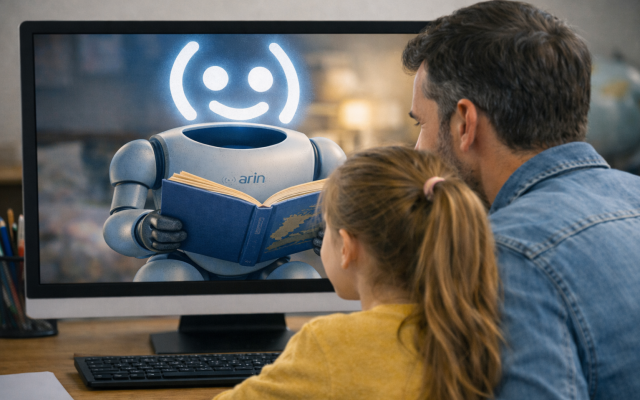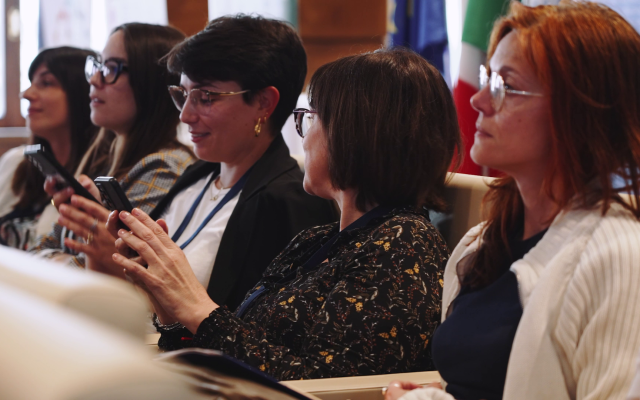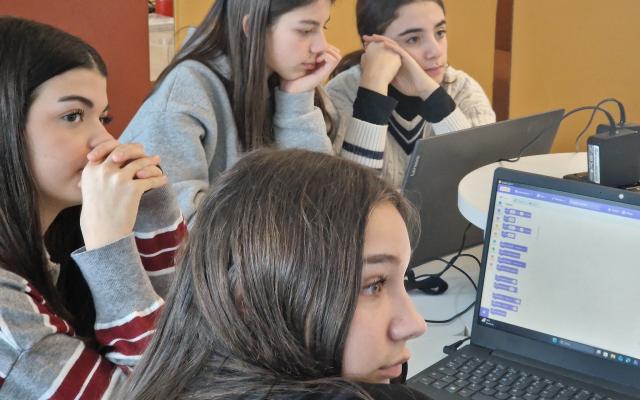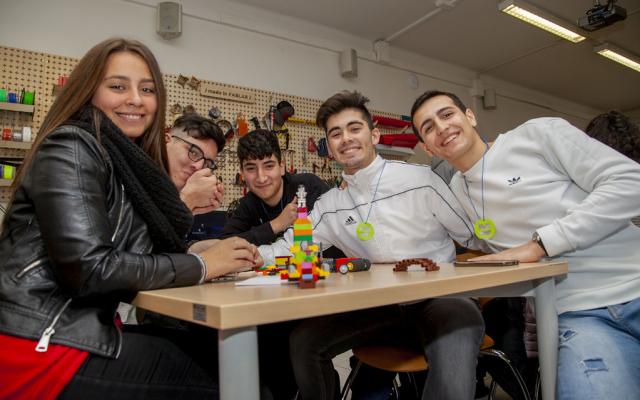At the Innovation Gym, the ProPART master's seminar reflects on agentic technologies, collective intelligence and new forms of open government in local areas
The Palestra dell'Innovazione hosted “Urban Intelligences”, a seminar addressing the theme of agentic technologies and civic participation, as part of the ProPART Master's in interactive and participatory design promoted by IUAV and Sapienza University of Rome [see news item Local alliances between intelligences]. While the first part of the afternoon was devoted to discussing the link between participation and civic technologies, the second part saw the launch of thematic round tables for the territorialisation of the “Manifesto for collective action on artificial intelligence and robotics”. Teachers and experts explored possible alternative ways of using artificial intelligence for civic purposes to transform cities in terms of sustainability and models of open and collaborative territorial governance.
In her welcome address, Mirta Michilli, Director General of the Fondazione Mondo Digitale ETS, launched a proposal for an upcoming meeting open to the neighbourhood on the occasion of the 25th anniversary of the Fondazione Mondo Digitale in 2026, while Antonio De Vito, Director General of Puglia Sviluppo, spoke about local organisations that support research, start-ups and innovative businesses. "Today, if a company does not engage in research and innovation, it cannot access the support tools made available by the Puglia Region. For Puglia, innovation is one of the pillars driving local growth and development. The involvement of local universities has enabled us to guide local organisations through the major challenges of growth, ecological transition and progress. The banking system, institutional investors, support tools and financing, together with the fund to attract venture capital and private funds, are the drivers of this community development. This structure is designed to open up the capital market to our companies, which would otherwise be inaccessible."
Stefano Simoncini, Sapienza University of Rome, in coordinating the meeting, expressed his hope that the initiative would be repeated in the future "in order to reflect, through our educational programme, on the relationship between technology and civic participation. Here at the Palestra dell'Innovazione, we have found the ideal context, a crossroads between civil society, businesses and educational institutions, for a critical reinterpretation of technology. We have joined forces with the Fondazione Mondo Digitale in the field of action research, experimenting with processes together in real time. Today, in particular, we were interested in exploring the latest frontier of AI and innovation with regard to the local horizon."
Alfonso Molina, scientific director of the Fondazione Mondo Digitale and personal chair in Technology Strategy at the University of Edinburgh, outlined the possible developments of generative artificial intelligence, hoping for its increasing use for creativity and the generation of progress: "Our Palestra dell'Innovazione consists of a series of environments and laboratories that are converging. Today we are in the phase of agentic AI for process automation, but we are moving towards artificial intelligence that can contribute to research. But people are using AI as therapy/companionship, to organise their lives, find purpose... so as personal support! According to MIT, collaboration with generative AI for Civic Engagement is characterised by a process in which design is people-centred, there is collaborative ideation, prototyping takes place with human supervision, it is important to develop guidelines, there is a focus on civic education and digital equity, and there are evaluation and governance phases. At FMD, AI is useful for research and creativity. We use it in our organisation (in the Academy with Arin), in the Itali.IA Lab project for digital literacy, in the Scuola del Noi project for widespread educational innovation, and in Pathway Companion.
Reflecting on possible futures, Gianni Dominici, CEO of Forum PA, points out that 'the more advanced a technology is, the more difficult it is to control, and this is particularly true of AI. Today, it could automate urban and territorial planning, but it could also obscure public decision-making criteria, prescribe solutions that appear neutral but reproduce biases, and reduce governance to the mere procedural execution of technical choices. This is why it is essential not to delegate its future evolution to others. AI must become the tool for smart public administration that can anticipate organisational trends. To prevent inefficiencies and detect weak but important signals. But to do this, we need to support creative thinking in schools and value the visionary talents that are fundamental to innovation, the “bridge builders” and those who embrace mistakes. In the public administration, the current competitions are aimed at professionals who could already be replaced by AI tools. We need to move from a hierarchical and bureaucratic public administration to a “sense and respond” approach, i.e. listening and responding, but also to organisations where people feel free to propose new ideas. We must also return to ecosystems and networks. AI must resonate with collective intelligence, and from this unpredictable modulation, the future can emerge.
Speaking about “AI and open data: potential and risks”, Vincenzo Patruno, project and data manager at OnData, emphasised the importance of knowledge and conscious use: 'It is not enough to access tools and ask questions; we need to know how to develop the prompts to achieve the objectives for which we are using these models. We would like to emphasise this need and also shine a spotlight on civic hacking for agentic management of technology. It is important to know how to best adopt new developments to lighten the burden on the community. Governing complexity is no easy task today!"
Antonella Melito, Vice President of the Rome Capital Statute and Technological Innovation Commission, spoke about the relationship between the city and innovation. 'Through the Smart City Lab Council, Rome Capital networks and acts as a meeting point between different realities capable of inspiring concrete action. The Council is a permanent laboratory and has succeeded in building innovation and sustainability policies. Another project is Roma 5G, which has channelled many resources to bring connectivity to 100 squares and all metro stops. For us, the goal must be to improve people's lives and bring human intelligence together with artificial intelligence. Then there is the Julia project, an AI-based digital assistant that provides integrated solutions for those travelling around Rome. Today, it is a case giver and we would like it to inspire other local initiatives. From 4 to 9 October 2026, we will organise Jazz Innovation di Roma Capitale at the Nuvola: we will bring together local authorities from all over Italy, of all sizes, to analyse the needs of their territories'.




